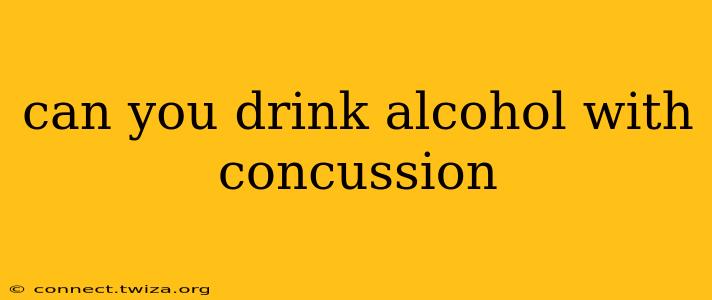A concussion, also known as a mild traumatic brain injury (mTBI), is a serious injury that requires careful management. One of the most crucial aspects of recovery is avoiding anything that could potentially exacerbate the injury or hinder the healing process. This includes alcohol. The short answer is: no, you absolutely should not drink alcohol with a concussion.
Alcohol consumption after a concussion can significantly impede recovery and increase the risk of serious complications. Let's explore why in detail.
How Does Alcohol Affect the Brain After a Concussion?
The brain is already vulnerable after a concussion. The impact has caused swelling, inflammation, and disruption of normal brain function. Alcohol acts as a central nervous system depressant, further slowing down brain activity and potentially worsening the existing damage. This means that:
- Increased Swelling: Alcohol can increase inflammation in the brain, adding to the swelling already present from the concussion. This increased swelling can prolong recovery time and potentially lead to more serious complications.
- Delayed Healing: The brain needs time to heal and repair itself after a concussion. Alcohol interferes with this process, slowing down the body's natural healing mechanisms. This can lead to prolonged symptoms and a longer recovery period.
- Exacerbated Symptoms: Alcohol can worsen common concussion symptoms such as headaches, dizziness, nausea, vomiting, and cognitive impairment (difficulty concentrating, memory problems, etc.).
- Increased Risk of Secondary Injury: In extreme cases, combining alcohol with a concussion can increase the risk of a secondary injury or even contribute to long-term complications such as post-concussion syndrome.
What are the Symptoms of a Concussion?
Recognizing the signs and symptoms of a concussion is crucial for prompt treatment and recovery. Some common symptoms include:
- Headache: Often described as a persistent throbbing or dull ache.
- Dizziness: Feeling unsteady or lightheaded.
- Nausea and Vomiting: Feeling sick to your stomach.
- Sensitivity to Light and Sound: Experiencing discomfort in brightly lit or noisy environments.
- Confusion and Disorientation: Difficulty remembering things or feeling lost or confused.
- Memory Problems: Trouble remembering events before or after the injury.
- Balance Problems: Difficulty maintaining balance or coordination.
- Fatigue: Feeling unusually tired or sluggish.
- Sleep disturbances: Difficulty sleeping or sleeping too much.
- Emotional changes: Irritability, anxiety, or depression.
How Long Should I Avoid Alcohol After a Concussion?
There's no single definitive answer to this question, as recovery time varies greatly depending on the severity of the concussion and the individual. It's essential to consult with a doctor or other healthcare professional. They can assess the severity of your injury and provide personalized guidance on when it's safe to resume alcohol consumption. Generally, however, it's advisable to avoid alcohol until you've fully recovered from all concussion symptoms and received medical clearance.
What Else Should I Avoid After a Concussion?
In addition to alcohol, you should avoid other substances that can further affect brain function, such as:
- Other drugs: This includes both illicit drugs and over-the-counter medications (unless prescribed by a doctor).
- Strenuous activity: Avoid physical exertion until you've fully recovered.
- Exposure to bright lights and loud noises: These can worsen symptoms.
When Should I Seek Medical Attention After a Head Injury?
It's crucial to seek immediate medical attention after any head injury, even if symptoms appear mild. Seek medical attention if you experience:
- Loss of consciousness
- Severe headache
- Persistent vomiting
- Seizures
- Slurred speech
- Weakness or numbness in limbs
- Changes in vision or hearing
- Deteriorating mental status
By following medical advice and avoiding alcohol and other potentially harmful substances, you can significantly improve your chances of a full and speedy recovery from a concussion. Remember, your health is paramount, and seeking professional medical help is always the best course of action.
